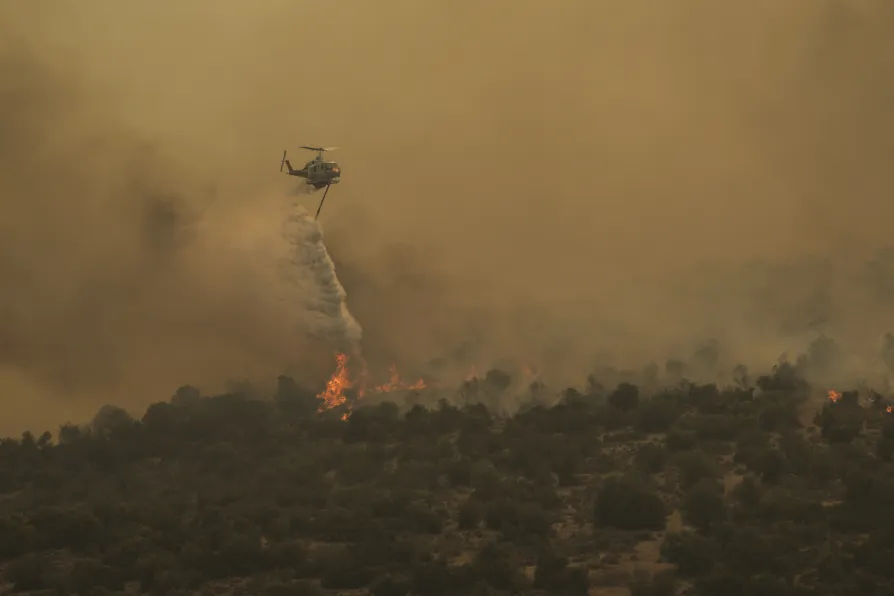
 A firefighting helicopter dumps water in Mandra west of Athens, on Tuesday, July 18, 2023.
A firefighting helicopter dumps water in Mandra west of Athens, on Tuesday, July 18, 2023.
HEATWAVES continue to sweep the globe today as the World Meteorological Organisation (WMO) warns that extreme weather patterns highlight the need for more climate action.
The intergovernmental body has warned that heatwaves are amongst the deadliest natural hazards, with thousands of people dying from heat-related causes each year.
This week, much of southern Europe and the Mediterranean has been gripped by record-breaking temperatures.
Italy’s health ministry on Monday issued red weather alerts for 20 of the country’s 27 main cities, with the number expected to rise to 23 tomorrow.
France’s public health agency said the current stretch of hot weather would “probably hospitalise or kill many people,” as heat waves have done almost every summer since 2015.
Authorities in North Macedonia extended a heat alert for the next 10 days, while Kosovo also issued warnings.
Power outages hit parts of Rome on Monday as the electricity grid struggled under heavy demand from air conditioners.
In Greece, thousands of people have been forced to flee their homes outside the capital Athens as high winds fanned wildfire flames.
Canada is, meanwhile, battling its worst wildfire season in history.
The WMO said the extreme heat and rainfall was expected to extend into August.
WMO secretary-general Professor Petteri Taalas said: “The extreme weather – an increasingly frequent occurrence in our warming climate – is having a major impact on human health, ecosystems, economies, agriculture, energy and water supplies.
“This underlines the increasing urgency of cutting greenhouse gas emissions as quickly and as deeply as possible.
“In addition, we have to step up efforts to help society adapt to what is unfortunately becoming the new normal.”
World Health Organisation director-general Tedros Adhanom Ghebreyesus also urged for world leaders to act, tweeting: “The climate crisis is not a warning. It’s happening.”
A heat dome over south-west United States saw extreme heat warnings from coast to coast today, with temperature records expected to be broken in 38 cities.
In China, a remote town in the north-west registered a national record of 52.2°C this week, and prolonged heat in the country is threatening power grids and crops.
Climate envoys from the world’s two biggest emitters — the US and China — met in Beijing this week to discuss the challenges of climate change, with US Climate Envoy John Kerry saying, optimistically: “Working and showing the rest of the world how we can co-operate and begin to address this with the urgency it requires is incredible.”

Home Secretary Cooper confirms plans to ban the group and claims its peaceful activists ‘meet the legal threshold under the Terrorism Act 2000’

US president says his nation might join forces with Israel in attacking Iran
















